MN5005 Business Law Case Study: Analysis of Article 101 of TFEU
VerifiedAdded on 2022/08/09
|8
|2083
|40
Case Study
AI Summary
This case study examines the application of Article 101 of the Treaty on the Functioning of the European Union (TFEU) to business arrangements, specifically focusing on whether the business arrangements of directors align with the regulations outlined in Article 101. The analysis delves into the implications of various agreements, concerted practices, and the rule of reason, referencing key legal precedents such as Standard Oil Co. of New Jersey v. United States and cases related to concerted practices. The study explores horizontal and vertical agreements, de minimis agreements, and the concept of 'undertaking' as defined in legal contexts. The paper discusses cases like Höfner and Elser v Macrotron GmbH, ICI v Commission (Dyestuffs), Consten & Grundig v. Commission, and Brasserie de Haecht v Wilkin to illustrate the impact of Article 101 on trade and market competition. The conclusion determines that the business arrangements were not in conformity with Article 101.
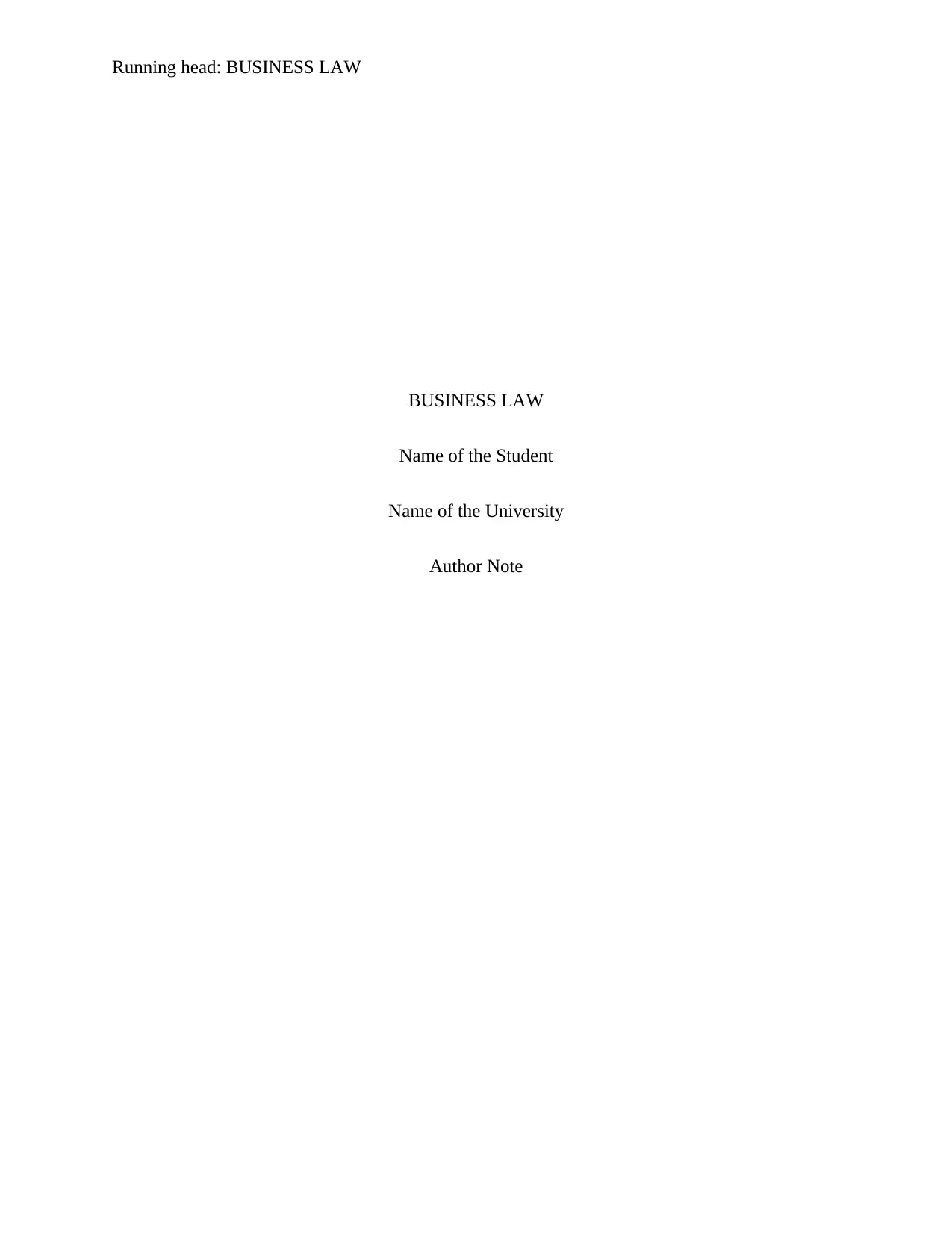
Running head: BUSINESS LAW
BUSINESS LAW
Name of the Student
Name of the University
Author Note
BUSINESS LAW
Name of the Student
Name of the University
Author Note
Paraphrase This Document
Need a fresh take? Get an instant paraphrase of this document with our AI Paraphraser
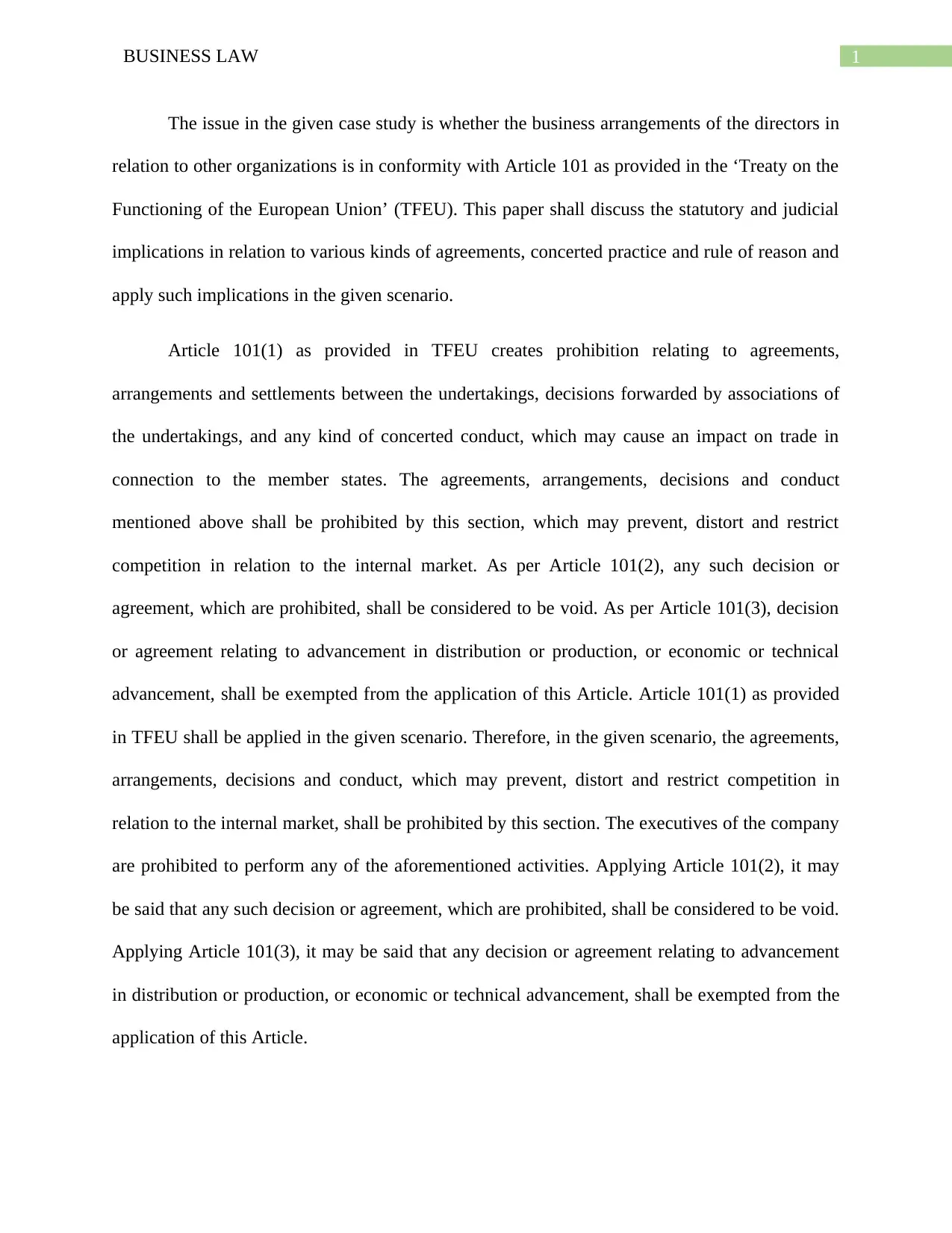
1BUSINESS LAW
The issue in the given case study is whether the business arrangements of the directors in
relation to other organizations is in conformity with Article 101 as provided in the ‘Treaty on the
Functioning of the European Union’ (TFEU). This paper shall discuss the statutory and judicial
implications in relation to various kinds of agreements, concerted practice and rule of reason and
apply such implications in the given scenario.
Article 101(1) as provided in TFEU creates prohibition relating to agreements,
arrangements and settlements between the undertakings, decisions forwarded by associations of
the undertakings, and any kind of concerted conduct, which may cause an impact on trade in
connection to the member states. The agreements, arrangements, decisions and conduct
mentioned above shall be prohibited by this section, which may prevent, distort and restrict
competition in relation to the internal market. As per Article 101(2), any such decision or
agreement, which are prohibited, shall be considered to be void. As per Article 101(3), decision
or agreement relating to advancement in distribution or production, or economic or technical
advancement, shall be exempted from the application of this Article. Article 101(1) as provided
in TFEU shall be applied in the given scenario. Therefore, in the given scenario, the agreements,
arrangements, decisions and conduct, which may prevent, distort and restrict competition in
relation to the internal market, shall be prohibited by this section. The executives of the company
are prohibited to perform any of the aforementioned activities. Applying Article 101(2), it may
be said that any such decision or agreement, which are prohibited, shall be considered to be void.
Applying Article 101(3), it may be said that any decision or agreement relating to advancement
in distribution or production, or economic or technical advancement, shall be exempted from the
application of this Article.
The issue in the given case study is whether the business arrangements of the directors in
relation to other organizations is in conformity with Article 101 as provided in the ‘Treaty on the
Functioning of the European Union’ (TFEU). This paper shall discuss the statutory and judicial
implications in relation to various kinds of agreements, concerted practice and rule of reason and
apply such implications in the given scenario.
Article 101(1) as provided in TFEU creates prohibition relating to agreements,
arrangements and settlements between the undertakings, decisions forwarded by associations of
the undertakings, and any kind of concerted conduct, which may cause an impact on trade in
connection to the member states. The agreements, arrangements, decisions and conduct
mentioned above shall be prohibited by this section, which may prevent, distort and restrict
competition in relation to the internal market. As per Article 101(2), any such decision or
agreement, which are prohibited, shall be considered to be void. As per Article 101(3), decision
or agreement relating to advancement in distribution or production, or economic or technical
advancement, shall be exempted from the application of this Article. Article 101(1) as provided
in TFEU shall be applied in the given scenario. Therefore, in the given scenario, the agreements,
arrangements, decisions and conduct, which may prevent, distort and restrict competition in
relation to the internal market, shall be prohibited by this section. The executives of the company
are prohibited to perform any of the aforementioned activities. Applying Article 101(2), it may
be said that any such decision or agreement, which are prohibited, shall be considered to be void.
Applying Article 101(3), it may be said that any decision or agreement relating to advancement
in distribution or production, or economic or technical advancement, shall be exempted from the
application of this Article.
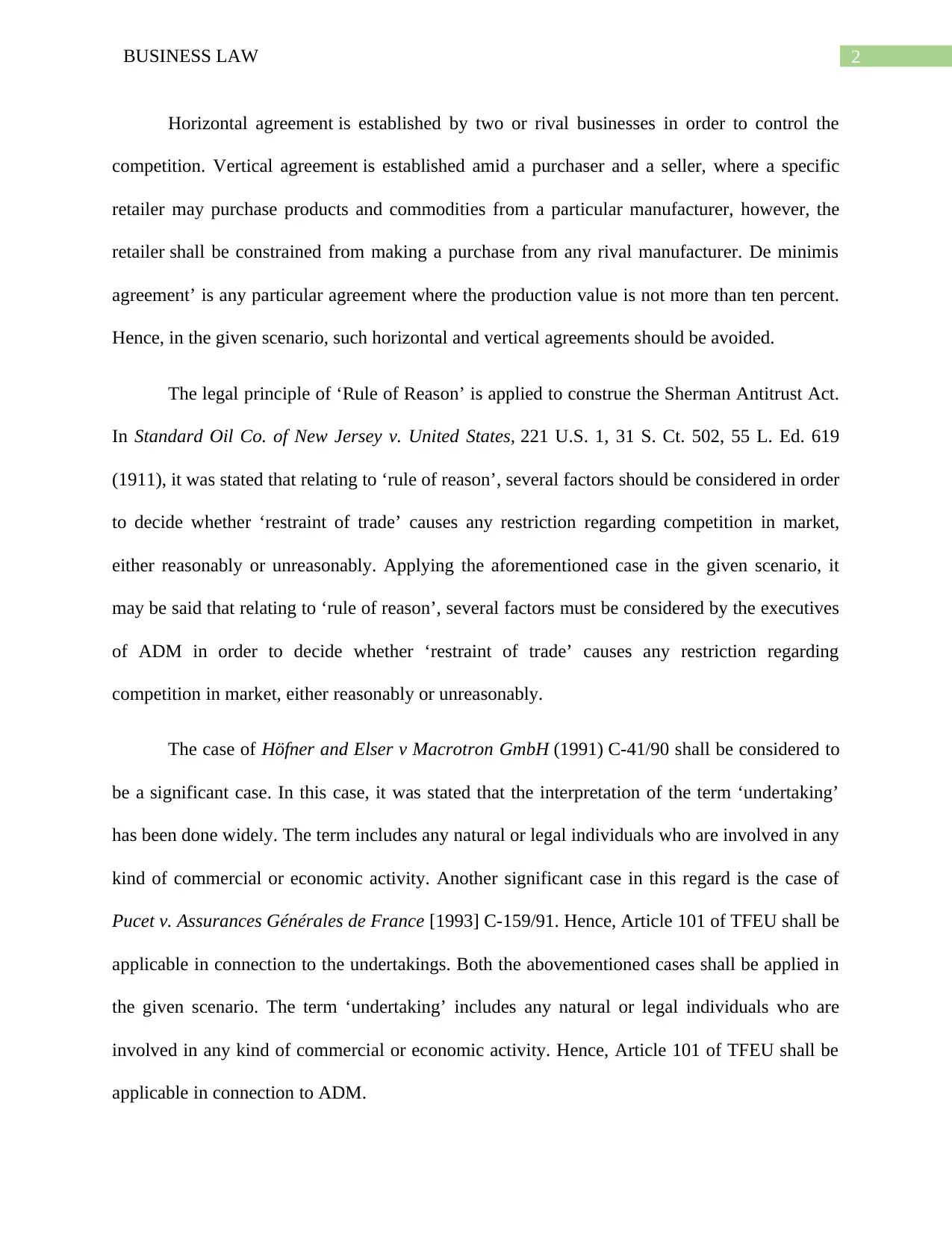
2BUSINESS LAW
Horizontal agreement is established by two or rival businesses in order to control the
competition. Vertical agreement is established amid a purchaser and a seller, where a specific
retailer may purchase products and commodities from a particular manufacturer, however, the
retailer shall be constrained from making a purchase from any rival manufacturer. De minimis
agreement’ is any particular agreement where the production value is not more than ten percent.
Hence, in the given scenario, such horizontal and vertical agreements should be avoided.
The legal principle of ‘Rule of Reason’ is applied to construe the Sherman Antitrust Act.
In Standard Oil Co. of New Jersey v. United States, 221 U.S. 1, 31 S. Ct. 502, 55 L. Ed. 619
(1911), it was stated that relating to ‘rule of reason’, several factors should be considered in order
to decide whether ‘restraint of trade’ causes any restriction regarding competition in market,
either reasonably or unreasonably. Applying the aforementioned case in the given scenario, it
may be said that relating to ‘rule of reason’, several factors must be considered by the executives
of ADM in order to decide whether ‘restraint of trade’ causes any restriction regarding
competition in market, either reasonably or unreasonably.
The case of Höfner and Elser v Macrotron GmbH (1991) C-41/90 shall be considered to
be a significant case. In this case, it was stated that the interpretation of the term ‘undertaking’
has been done widely. The term includes any natural or legal individuals who are involved in any
kind of commercial or economic activity. Another significant case in this regard is the case of
Pucet v. Assurances Générales de France [1993] C-159/91. Hence, Article 101 of TFEU shall be
applicable in connection to the undertakings. Both the abovementioned cases shall be applied in
the given scenario. The term ‘undertaking’ includes any natural or legal individuals who are
involved in any kind of commercial or economic activity. Hence, Article 101 of TFEU shall be
applicable in connection to ADM.
Horizontal agreement is established by two or rival businesses in order to control the
competition. Vertical agreement is established amid a purchaser and a seller, where a specific
retailer may purchase products and commodities from a particular manufacturer, however, the
retailer shall be constrained from making a purchase from any rival manufacturer. De minimis
agreement’ is any particular agreement where the production value is not more than ten percent.
Hence, in the given scenario, such horizontal and vertical agreements should be avoided.
The legal principle of ‘Rule of Reason’ is applied to construe the Sherman Antitrust Act.
In Standard Oil Co. of New Jersey v. United States, 221 U.S. 1, 31 S. Ct. 502, 55 L. Ed. 619
(1911), it was stated that relating to ‘rule of reason’, several factors should be considered in order
to decide whether ‘restraint of trade’ causes any restriction regarding competition in market,
either reasonably or unreasonably. Applying the aforementioned case in the given scenario, it
may be said that relating to ‘rule of reason’, several factors must be considered by the executives
of ADM in order to decide whether ‘restraint of trade’ causes any restriction regarding
competition in market, either reasonably or unreasonably.
The case of Höfner and Elser v Macrotron GmbH (1991) C-41/90 shall be considered to
be a significant case. In this case, it was stated that the interpretation of the term ‘undertaking’
has been done widely. The term includes any natural or legal individuals who are involved in any
kind of commercial or economic activity. Another significant case in this regard is the case of
Pucet v. Assurances Générales de France [1993] C-159/91. Hence, Article 101 of TFEU shall be
applicable in connection to the undertakings. Both the abovementioned cases shall be applied in
the given scenario. The term ‘undertaking’ includes any natural or legal individuals who are
involved in any kind of commercial or economic activity. Hence, Article 101 of TFEU shall be
applicable in connection to ADM.
⊘ This is a preview!⊘
Do you want full access?
Subscribe today to unlock all pages.

Trusted by 1+ million students worldwide
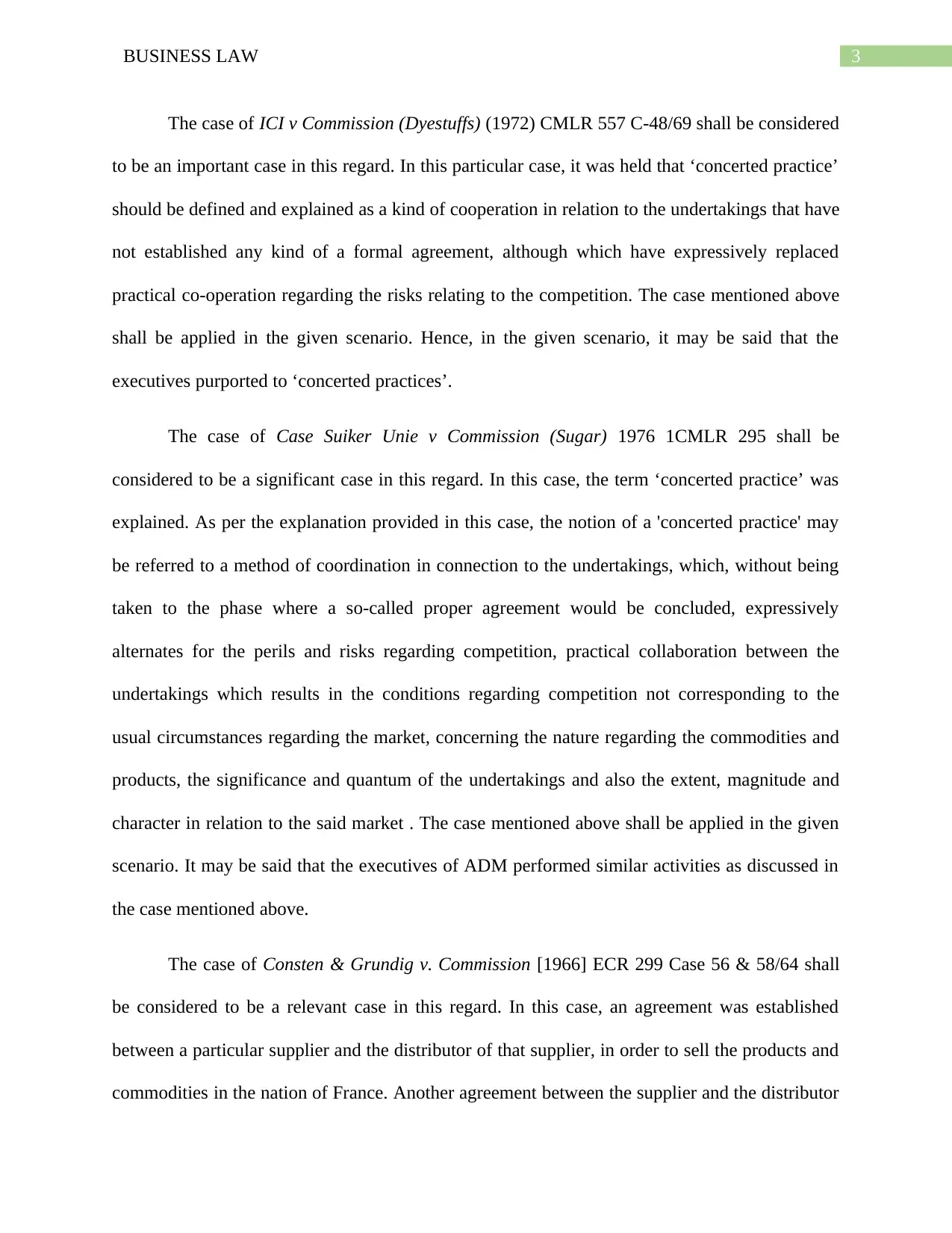
3BUSINESS LAW
The case of ICI v Commission (Dyestuffs) (1972) CMLR 557 C-48/69 shall be considered
to be an important case in this regard. In this particular case, it was held that ‘concerted practice’
should be defined and explained as a kind of cooperation in relation to the undertakings that have
not established any kind of a formal agreement, although which have expressively replaced
practical co-operation regarding the risks relating to the competition. The case mentioned above
shall be applied in the given scenario. Hence, in the given scenario, it may be said that the
executives purported to ‘concerted practices’.
The case of Case Suiker Unie v Commission (Sugar) 1976 1CMLR 295 shall be
considered to be a significant case in this regard. In this case, the term ‘concerted practice’ was
explained. As per the explanation provided in this case, the notion of a 'concerted practice' may
be referred to a method of coordination in connection to the undertakings, which, without being
taken to the phase where a so-called proper agreement would be concluded, expressively
alternates for the perils and risks regarding competition, practical collaboration between the
undertakings which results in the conditions regarding competition not corresponding to the
usual circumstances regarding the market, concerning the nature regarding the commodities and
products, the significance and quantum of the undertakings and also the extent, magnitude and
character in relation to the said market . The case mentioned above shall be applied in the given
scenario. It may be said that the executives of ADM performed similar activities as discussed in
the case mentioned above.
The case of Consten & Grundig v. Commission [1966] ECR 299 Case 56 & 58/64 shall
be considered to be a relevant case in this regard. In this case, an agreement was established
between a particular supplier and the distributor of that supplier, in order to sell the products and
commodities in the nation of France. Another agreement between the supplier and the distributor
The case of ICI v Commission (Dyestuffs) (1972) CMLR 557 C-48/69 shall be considered
to be an important case in this regard. In this particular case, it was held that ‘concerted practice’
should be defined and explained as a kind of cooperation in relation to the undertakings that have
not established any kind of a formal agreement, although which have expressively replaced
practical co-operation regarding the risks relating to the competition. The case mentioned above
shall be applied in the given scenario. Hence, in the given scenario, it may be said that the
executives purported to ‘concerted practices’.
The case of Case Suiker Unie v Commission (Sugar) 1976 1CMLR 295 shall be
considered to be a significant case in this regard. In this case, the term ‘concerted practice’ was
explained. As per the explanation provided in this case, the notion of a 'concerted practice' may
be referred to a method of coordination in connection to the undertakings, which, without being
taken to the phase where a so-called proper agreement would be concluded, expressively
alternates for the perils and risks regarding competition, practical collaboration between the
undertakings which results in the conditions regarding competition not corresponding to the
usual circumstances regarding the market, concerning the nature regarding the commodities and
products, the significance and quantum of the undertakings and also the extent, magnitude and
character in relation to the said market . The case mentioned above shall be applied in the given
scenario. It may be said that the executives of ADM performed similar activities as discussed in
the case mentioned above.
The case of Consten & Grundig v. Commission [1966] ECR 299 Case 56 & 58/64 shall
be considered to be a relevant case in this regard. In this case, an agreement was established
between a particular supplier and the distributor of that supplier, in order to sell the products and
commodities in the nation of France. Another agreement between the supplier and the distributor
Paraphrase This Document
Need a fresh take? Get an instant paraphrase of this document with our AI Paraphraser
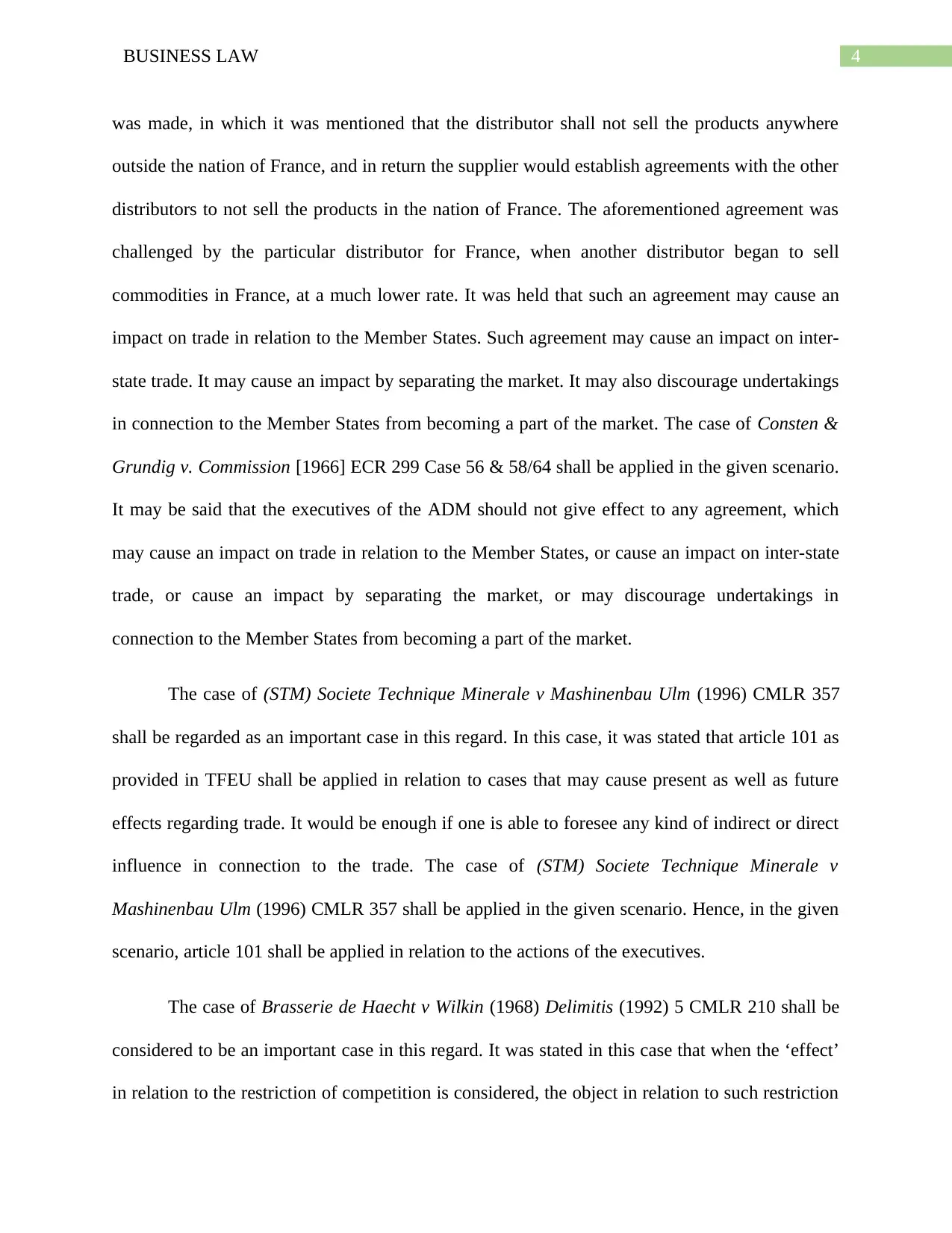
4BUSINESS LAW
was made, in which it was mentioned that the distributor shall not sell the products anywhere
outside the nation of France, and in return the supplier would establish agreements with the other
distributors to not sell the products in the nation of France. The aforementioned agreement was
challenged by the particular distributor for France, when another distributor began to sell
commodities in France, at a much lower rate. It was held that such an agreement may cause an
impact on trade in relation to the Member States. Such agreement may cause an impact on inter-
state trade. It may cause an impact by separating the market. It may also discourage undertakings
in connection to the Member States from becoming a part of the market. The case of Consten &
Grundig v. Commission [1966] ECR 299 Case 56 & 58/64 shall be applied in the given scenario.
It may be said that the executives of the ADM should not give effect to any agreement, which
may cause an impact on trade in relation to the Member States, or cause an impact on inter-state
trade, or cause an impact by separating the market, or may discourage undertakings in
connection to the Member States from becoming a part of the market.
The case of (STM) Societe Technique Minerale v Mashinenbau Ulm (1996) CMLR 357
shall be regarded as an important case in this regard. In this case, it was stated that article 101 as
provided in TFEU shall be applied in relation to cases that may cause present as well as future
effects regarding trade. It would be enough if one is able to foresee any kind of indirect or direct
influence in connection to the trade. The case of (STM) Societe Technique Minerale v
Mashinenbau Ulm (1996) CMLR 357 shall be applied in the given scenario. Hence, in the given
scenario, article 101 shall be applied in relation to the actions of the executives.
The case of Brasserie de Haecht v Wilkin (1968) Delimitis (1992) 5 CMLR 210 shall be
considered to be an important case in this regard. It was stated in this case that when the ‘effect’
in relation to the restriction of competition is considered, the object in relation to such restriction
was made, in which it was mentioned that the distributor shall not sell the products anywhere
outside the nation of France, and in return the supplier would establish agreements with the other
distributors to not sell the products in the nation of France. The aforementioned agreement was
challenged by the particular distributor for France, when another distributor began to sell
commodities in France, at a much lower rate. It was held that such an agreement may cause an
impact on trade in relation to the Member States. Such agreement may cause an impact on inter-
state trade. It may cause an impact by separating the market. It may also discourage undertakings
in connection to the Member States from becoming a part of the market. The case of Consten &
Grundig v. Commission [1966] ECR 299 Case 56 & 58/64 shall be applied in the given scenario.
It may be said that the executives of the ADM should not give effect to any agreement, which
may cause an impact on trade in relation to the Member States, or cause an impact on inter-state
trade, or cause an impact by separating the market, or may discourage undertakings in
connection to the Member States from becoming a part of the market.
The case of (STM) Societe Technique Minerale v Mashinenbau Ulm (1996) CMLR 357
shall be regarded as an important case in this regard. In this case, it was stated that article 101 as
provided in TFEU shall be applied in relation to cases that may cause present as well as future
effects regarding trade. It would be enough if one is able to foresee any kind of indirect or direct
influence in connection to the trade. The case of (STM) Societe Technique Minerale v
Mashinenbau Ulm (1996) CMLR 357 shall be applied in the given scenario. Hence, in the given
scenario, article 101 shall be applied in relation to the actions of the executives.
The case of Brasserie de Haecht v Wilkin (1968) Delimitis (1992) 5 CMLR 210 shall be
considered to be an important case in this regard. It was stated in this case that when the ‘effect’
in relation to the restriction of competition is considered, the object in relation to such restriction
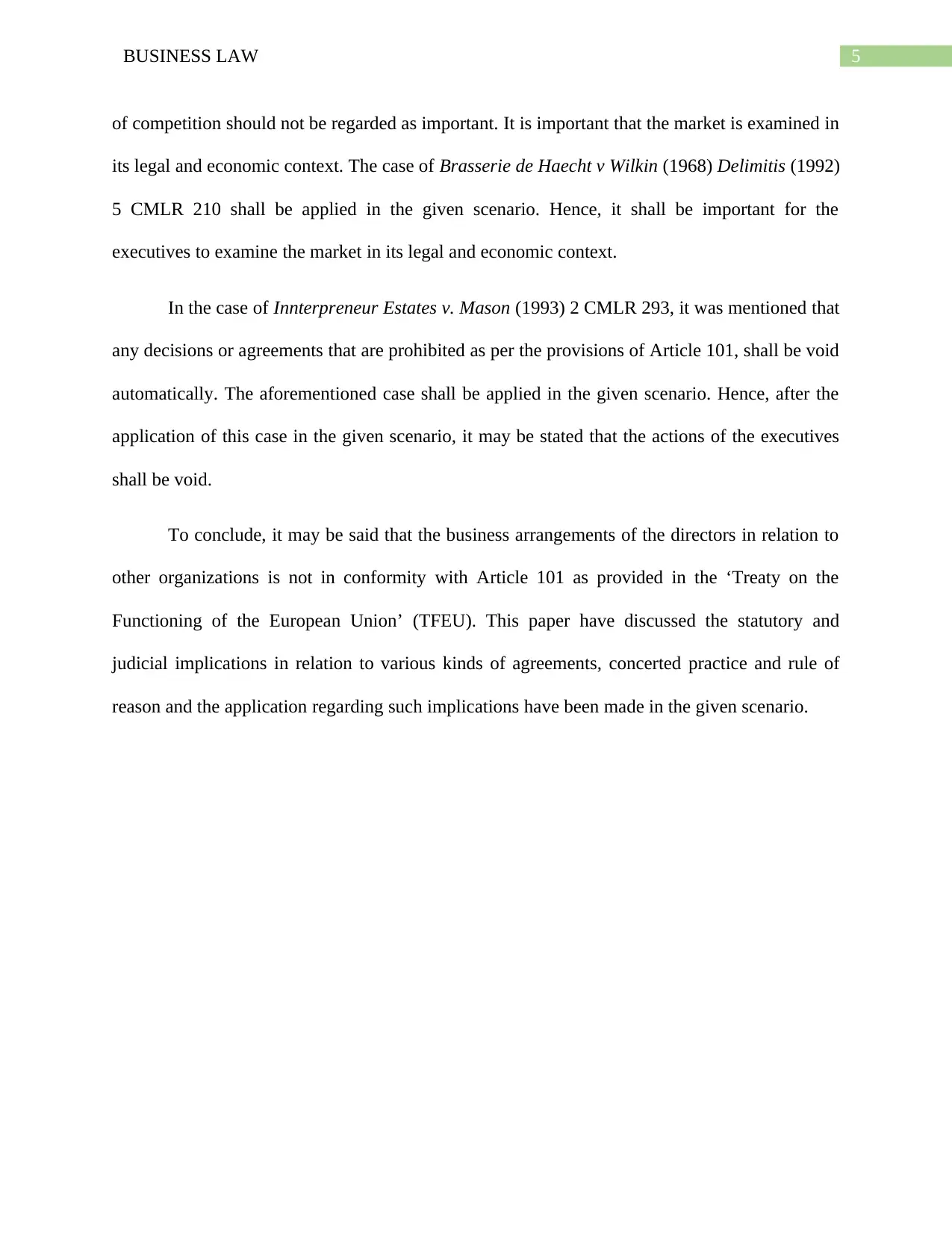
5BUSINESS LAW
of competition should not be regarded as important. It is important that the market is examined in
its legal and economic context. The case of Brasserie de Haecht v Wilkin (1968) Delimitis (1992)
5 CMLR 210 shall be applied in the given scenario. Hence, it shall be important for the
executives to examine the market in its legal and economic context.
In the case of Innterpreneur Estates v. Mason (1993) 2 CMLR 293, it was mentioned that
any decisions or agreements that are prohibited as per the provisions of Article 101, shall be void
automatically. The aforementioned case shall be applied in the given scenario. Hence, after the
application of this case in the given scenario, it may be stated that the actions of the executives
shall be void.
To conclude, it may be said that the business arrangements of the directors in relation to
other organizations is not in conformity with Article 101 as provided in the ‘Treaty on the
Functioning of the European Union’ (TFEU). This paper have discussed the statutory and
judicial implications in relation to various kinds of agreements, concerted practice and rule of
reason and the application regarding such implications have been made in the given scenario.
of competition should not be regarded as important. It is important that the market is examined in
its legal and economic context. The case of Brasserie de Haecht v Wilkin (1968) Delimitis (1992)
5 CMLR 210 shall be applied in the given scenario. Hence, it shall be important for the
executives to examine the market in its legal and economic context.
In the case of Innterpreneur Estates v. Mason (1993) 2 CMLR 293, it was mentioned that
any decisions or agreements that are prohibited as per the provisions of Article 101, shall be void
automatically. The aforementioned case shall be applied in the given scenario. Hence, after the
application of this case in the given scenario, it may be stated that the actions of the executives
shall be void.
To conclude, it may be said that the business arrangements of the directors in relation to
other organizations is not in conformity with Article 101 as provided in the ‘Treaty on the
Functioning of the European Union’ (TFEU). This paper have discussed the statutory and
judicial implications in relation to various kinds of agreements, concerted practice and rule of
reason and the application regarding such implications have been made in the given scenario.
⊘ This is a preview!⊘
Do you want full access?
Subscribe today to unlock all pages.

Trusted by 1+ million students worldwide
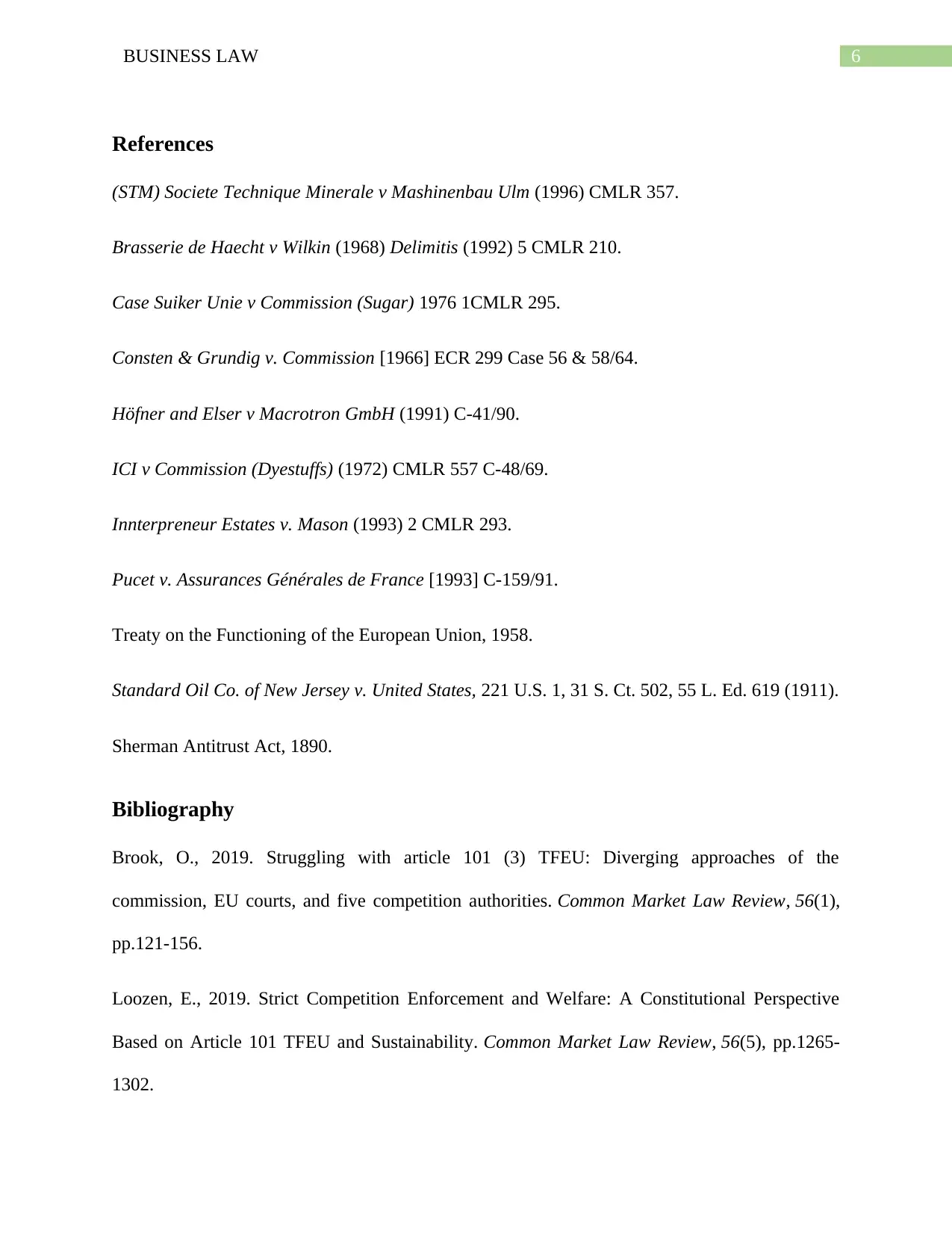
6BUSINESS LAW
References
(STM) Societe Technique Minerale v Mashinenbau Ulm (1996) CMLR 357.
Brasserie de Haecht v Wilkin (1968) Delimitis (1992) 5 CMLR 210.
Case Suiker Unie v Commission (Sugar) 1976 1CMLR 295.
Consten & Grundig v. Commission [1966] ECR 299 Case 56 & 58/64.
Höfner and Elser v Macrotron GmbH (1991) C-41/90.
ICI v Commission (Dyestuffs) (1972) CMLR 557 C-48/69.
Innterpreneur Estates v. Mason (1993) 2 CMLR 293.
Pucet v. Assurances Générales de France [1993] C-159/91.
Treaty on the Functioning of the European Union, 1958.
Standard Oil Co. of New Jersey v. United States, 221 U.S. 1, 31 S. Ct. 502, 55 L. Ed. 619 (1911).
Sherman Antitrust Act, 1890.
Bibliography
Brook, O., 2019. Struggling with article 101 (3) TFEU: Diverging approaches of the
commission, EU courts, and five competition authorities. Common Market Law Review, 56(1),
pp.121-156.
Loozen, E., 2019. Strict Competition Enforcement and Welfare: A Constitutional Perspective
Based on Article 101 TFEU and Sustainability. Common Market Law Review, 56(5), pp.1265-
1302.
References
(STM) Societe Technique Minerale v Mashinenbau Ulm (1996) CMLR 357.
Brasserie de Haecht v Wilkin (1968) Delimitis (1992) 5 CMLR 210.
Case Suiker Unie v Commission (Sugar) 1976 1CMLR 295.
Consten & Grundig v. Commission [1966] ECR 299 Case 56 & 58/64.
Höfner and Elser v Macrotron GmbH (1991) C-41/90.
ICI v Commission (Dyestuffs) (1972) CMLR 557 C-48/69.
Innterpreneur Estates v. Mason (1993) 2 CMLR 293.
Pucet v. Assurances Générales de France [1993] C-159/91.
Treaty on the Functioning of the European Union, 1958.
Standard Oil Co. of New Jersey v. United States, 221 U.S. 1, 31 S. Ct. 502, 55 L. Ed. 619 (1911).
Sherman Antitrust Act, 1890.
Bibliography
Brook, O., 2019. Struggling with article 101 (3) TFEU: Diverging approaches of the
commission, EU courts, and five competition authorities. Common Market Law Review, 56(1),
pp.121-156.
Loozen, E., 2019. Strict Competition Enforcement and Welfare: A Constitutional Perspective
Based on Article 101 TFEU and Sustainability. Common Market Law Review, 56(5), pp.1265-
1302.
Paraphrase This Document
Need a fresh take? Get an instant paraphrase of this document with our AI Paraphraser
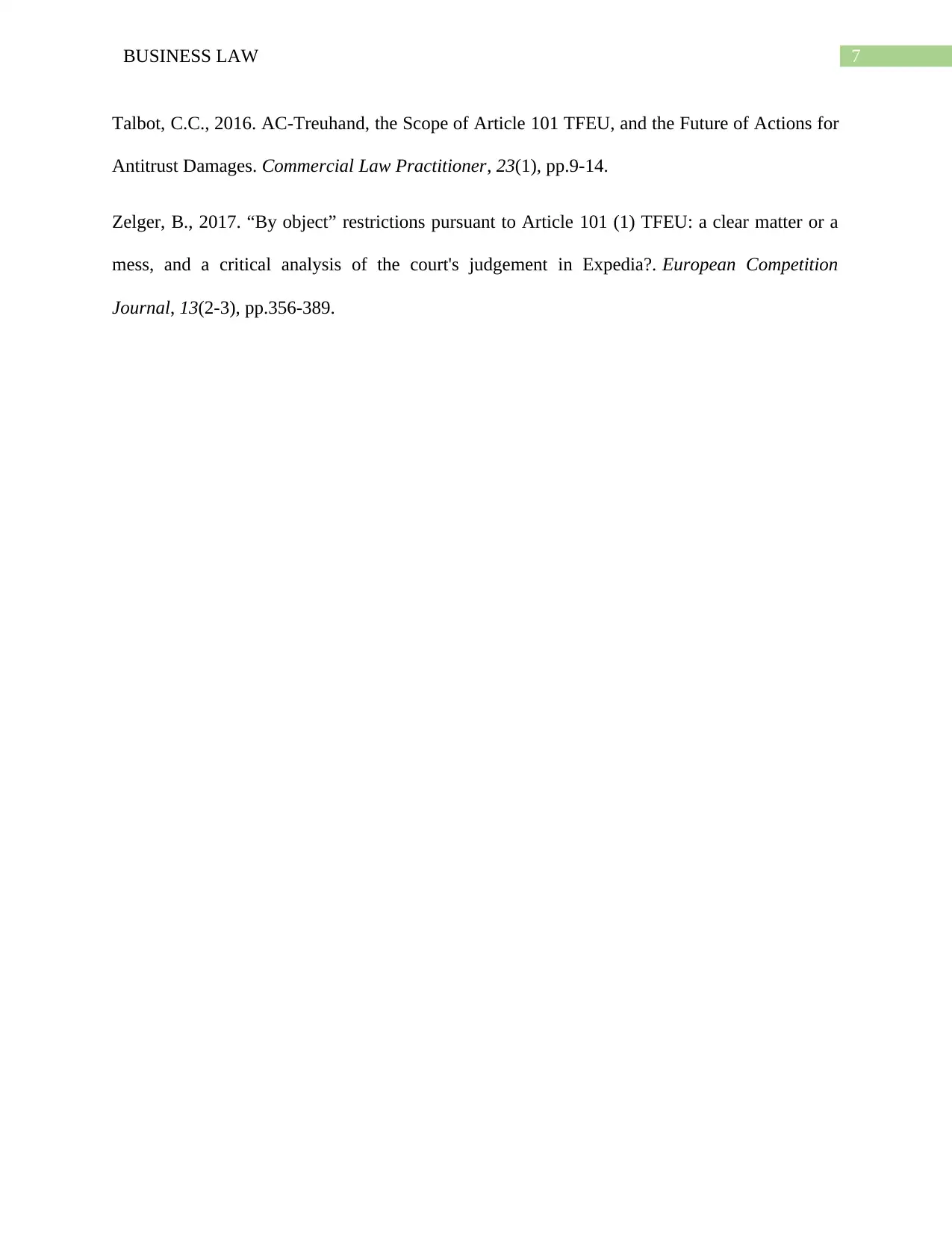
7BUSINESS LAW
Talbot, C.C., 2016. AC-Treuhand, the Scope of Article 101 TFEU, and the Future of Actions for
Antitrust Damages. Commercial Law Practitioner, 23(1), pp.9-14.
Zelger, B., 2017. “By object” restrictions pursuant to Article 101 (1) TFEU: a clear matter or a
mess, and a critical analysis of the court's judgement in Expedia?. European Competition
Journal, 13(2-3), pp.356-389.
Talbot, C.C., 2016. AC-Treuhand, the Scope of Article 101 TFEU, and the Future of Actions for
Antitrust Damages. Commercial Law Practitioner, 23(1), pp.9-14.
Zelger, B., 2017. “By object” restrictions pursuant to Article 101 (1) TFEU: a clear matter or a
mess, and a critical analysis of the court's judgement in Expedia?. European Competition
Journal, 13(2-3), pp.356-389.
1 out of 8
Related Documents
Your All-in-One AI-Powered Toolkit for Academic Success.
+13062052269
info@desklib.com
Available 24*7 on WhatsApp / Email
![[object Object]](/_next/static/media/star-bottom.7253800d.svg)
Unlock your academic potential
Copyright © 2020–2025 A2Z Services. All Rights Reserved. Developed and managed by ZUCOL.





